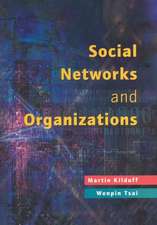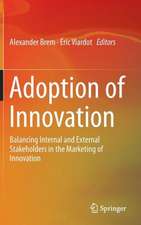Management Education in the Network Economy: Its Context, Content, and Organization
Autor Peter J. van Baalen, Lars T. Moratisen Limba Engleză Paperback – 30 oct 2012
| Toate formatele și edițiile | Preț | Express |
|---|---|---|
| Paperback (1) | 635.80 lei 6-8 săpt. | |
| Springer Us – 30 oct 2012 | 635.80 lei 6-8 săpt. | |
| Hardback (1) | 643.16 lei 6-8 săpt. | |
| Springer Us – 31 oct 2001 | 643.16 lei 6-8 săpt. |
Preț: 635.80 lei
Preț vechi: 748.00 lei
-15% Nou
Puncte Express: 954
Preț estimativ în valută:
121.66€ • 132.57$ • 102.52£
121.66€ • 132.57$ • 102.52£
Carte tipărită la comandă
Livrare economică 23 aprilie-07 mai
Preluare comenzi: 021 569.72.76
Specificații
ISBN-13: 9781461352594
ISBN-10: 1461352592
Pagini: 204
Ilustrații: XI, 188 p.
Dimensiuni: 160 x 240 x 11 mm
Greutate: 0.29 kg
Ediția:2001
Editura: Springer Us
Colecția Springer
Locul publicării:New York, NY, United States
ISBN-10: 1461352592
Pagini: 204
Ilustrații: XI, 188 p.
Dimensiuni: 160 x 240 x 11 mm
Greutate: 0.29 kg
Ediția:2001
Editura: Springer Us
Colecția Springer
Locul publicării:New York, NY, United States
Public țintă
ResearchCuprins
1 Introduction.- Why this book?.- Managing and learning in the 21st century.- Aims of this book and target audiences.- Composition of this book.- Bookmark.- 2 The new economy.- The new economy and industrial revolution.- Defining the new economy.- The macroeconomic view: structural features of the new economy.- The role and contribution of ICT: some evidence.- Technology, information, and new economics.- ICT and economics.- Three opinions on the future of the new economy.- Value creation in the new economy: the importance of intangibles competitive resources.- Final thoughts: towards a network view.- 3 The network economy.- Informationalism: the new socio-economic paradigm.- Network technology, network economics, and network dynamics.- Network dynamics: richness and reach.- Definitions of networks.- Organizing for flexible value creation: the network enterprise.- Final thoughts: the network economy and challenges for education and business schools.- 4 The manager of the 21st century: Management knowledge, management skills, and the management curriculum.- The new production of knowledge.- Rounding out the manager’s job for the 21st century.- Traits of the 21st century manager.- Competencies and skills.- Role contingency and network roles.- Levels of network management and network management capabilities.- Management knowledge for the 21st century and the business school curriculum.- The management curriculum.- Final thoughts.- 5 The new learning.- Features and principles of the new learning environment.- From teaching to learning: the consequences of a new educational paradigm.- The new learning, management knowledge, and management learning.- Pedagogical implications: ‘active’ forms of learning.- Organizing for learning: networks and communities of practice.-Network learning.- Education and ICT: why schools should(n’t) invest in educational technology.- Limitations of ICT.- Effectiveness of educational technology.- Technology-enabled learning environments.- Pedagogical models and applications of ICT.- Management education and ICT.- Final thoughts.- 6 The institutional perspective: Business schools’ markets, organization, and strategy.- Introduction: new institutional realities.- The institutional environment.- A strategy of partnerships.- Prospering through partnering: examples from networks in practice.- Perspectives on knowledge institutions: concepts of universities and business schools.- The networked business school.- Case study of the networked business school: IMD Lausanne.- Final thoughts.- 7 Epilogue: the need for strategic academic leadership.- Strategic academic leadership.- Managing imbalance: the art of network management.- References.
Caracteristici
Includes supplementary material: sn.pub/extras

















